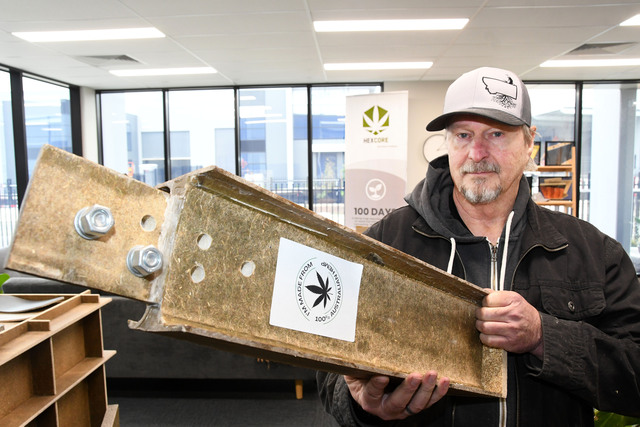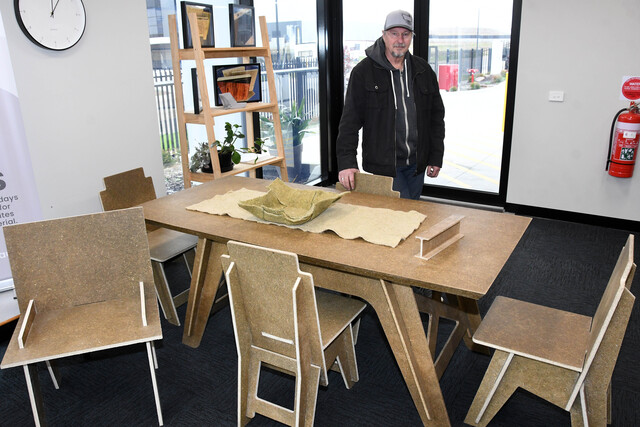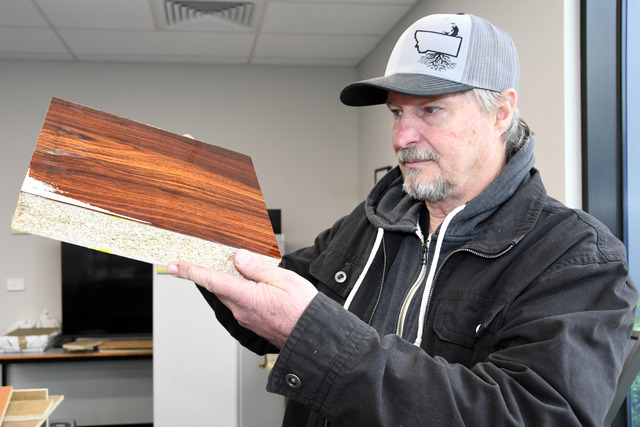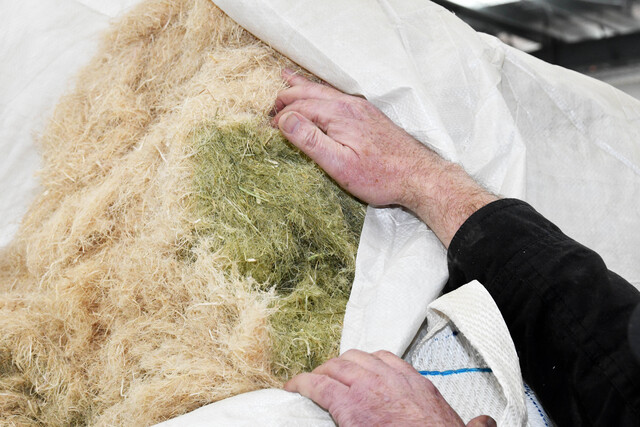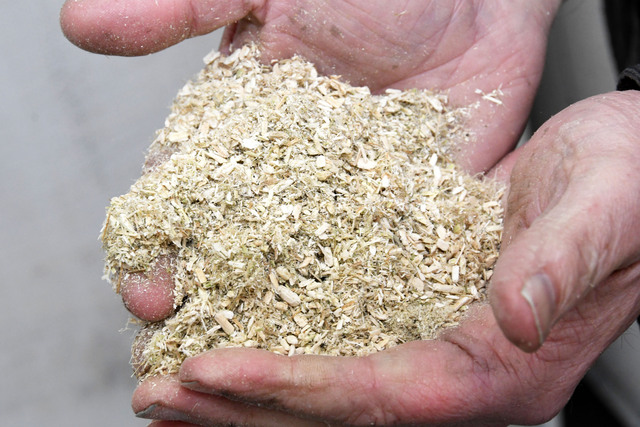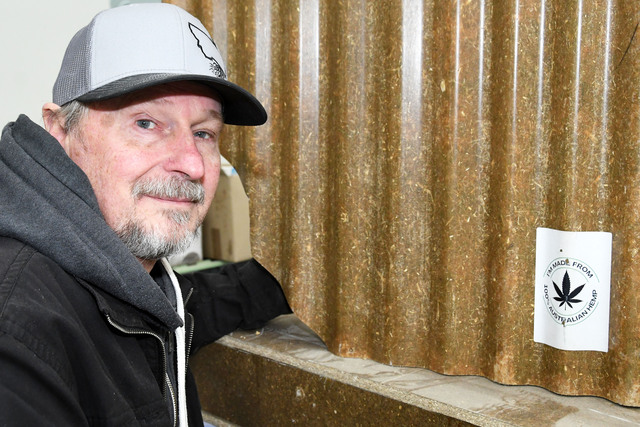With the building industry still under stress from high demand and conventional materials skyrocketing in cost, the time is ripe for a radical alternative. Some argue the answer doesn’t have to be high-tech or synthetic, rather something that has been cultivated for thousands of years. Industrial hemp. Pakenham’s Hexcore Hemp Processing is one of the country’s leading manufacturers in this promising industry, Gazette journalist COREY EVERITT spoke with owner Brett Boag about the potential for one of the strongest plant fibres in the world.
Hexcore set up shop in a brand new factory just off South East Boulevard about 18 months ago, yet already it’s ‘so busy it’s scary’ as Brett said.
Hexcore makes building materials; using not timber, not concrete, not clay, nor galvanised steel.
They use hemp seeds, turning them into I-beams, panels, furniture frames and much more – all with a strength greater than hardwoods.
Many builders, architects, interior designers, and furniture fabricators are seeking out Hexcore for not only its strength but its speed.
A hemp crop can grow to maturity and be cultivated within approximately 100 days from which they then make their variety of products.
“It’s the strongest natural plant fibre on Earth, so if you only go for fibrous materials you wanna start with the strongest one you can,” Brett said.
“We way exceed the capabilities of what timber can do. It’s very versatile, we can shape it, we can do almost anything with it.”
Furthermore, it’s an effective insulator.
“It’s thermally and acoustically very insulating, so you can make internal walls 40 mil wide. They will be stronger than our current walls, but also sound deadening,” Brett said.
“So you’re basically in an environment that is totally sustainable all throughout the year, probably averaging 21, 23 degrees internally.”
However, industrial hemp’s most intriguing attribute is its fire resistance. Something that has recently seen Hexcore collaborate with CSIRO, as well as actor Zac Efron.
The CSIRO conducted an experiment to see how hemp withstands a bushfire where Hexcore provided a small hemp construction which was promptly set alight by a controlled inferno in NSW.
It caught the interest of Efron’s travel show Down to Earth who joined in to cover the experiment and interview Hexcore on their work.
Though the CSIRO hasn’t released the final findings yet, the building didn’t collapse or burn from the flames, as Brett relayed it was scorched externally while the inside remained stable.
Using only 22 mil thick panels under fire for approximately 40 minutes, the experiment tracked the temperature of the external and an internal frame, the findings that Brett saw were remarkable.
“Internal front wall was 29.2 degrees, external was 1025 degrees,” Brett said, relaying some of the readings on the day.
“Internal glass was 120, external 1037, so that glass just melted.”
While the internal temp resisted the heat, the external could still maintain its structure through 1000-degree heat.
Between hemp pillars were also placed steel, which reached a far higher temp and bowed, the hemp remained sturdy.
Industrial hemp is strong, quick to make and an extremely insulating material – even potentially in a bushfire – yet has largely been an unexplored industry for the past three decades and before that its cultivation was outright illegal.
Brett has been in the industry for decades, yet he has spent most of it in China where he ran a hemp manufacturer in Qingdao before returning to Australia a few years ago.
China is the first known cultivator of hemp. Some suggest its known recordings date back as far as 5000 years ago where it was used for clothing, food and medicine.
Approximately 500 years ago, hemp was widely grown in Europe where it was produced for a variety of applications.
Yet centuries later, it was mostly banned in the western world largely due to the association with its more controversial cousin – marijuana.
In Victoria, hemp was made legal in the 90s yet the industry has remained stagnant with a number of planning and regulatory hangovers, that many argue is due to it still being on the state’s drugs and poison registry.
The reality of this for Brett, is that he must source industrial hemp interstate as there is no reliable producer in Victoria.
Even though they are the same cannabis plant, hemp is different to marijuana in that it has a negligible amount of tetrahydrocannabinol (THC) – the psychoactive component of marijuana.
“There are some historical pieces of the whole puzzle that never were done properly,” Brett said.
“It should have never been made illegal, there is nothing in this plant that is illegal. The only thing is the plants look the same.
“There are a hundred different varieties of mushrooms that can kill you in a heartbeat, but there is no register on them.
“It’s not legal to grow mushrooms, but it’s illegal to grow hemp.”
Despite this, Brett is hopeful for the future as he sees ‘farmers very soon will have no trouble growing a crop’.
He has seen change happen himself, he originally got into the industry from Adrian and Anthony Clarke who ran Textile & Composite Industries (TCI), an equipment company geared to hemp cultivation.
Adrian Clarke invented the D8 Decorticator, a machine that freed the industry from retting, allowing for stronger produce and saving months between cultivation and production.
TCI’s work in the 90s showed governments the potential of the industry and it influenced the Kennett Government to initially legalise industry hemp.
A recent push has come from the Legalise Cannabis Party who have moved a bill currently in State Parliament to create an independent legislation for industrial hemp, where it is regulated as an industry rather than a poison.
Brett sees ’big gains, big pluses’ if the industry is set free.
“Hemp is a brilliant plant, it offers so many advantages and it can do so much, the limitation has always been legislation from government,” Brett said.
“When I was in China we weren’t doing any of this to such an extent and the Chinese still aren’t doing any of this.
“Most people don’t think – as a fibre – the hemp plant has much value apart from clothing.
“I do see the hemp industry growing massively, in a short time now because of all the pressure on housing and construction, it will be able to take over the market.

